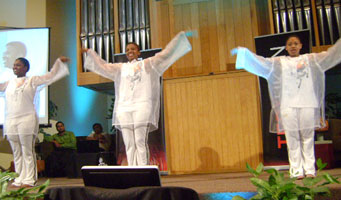 | 
Inspired by the sharing of ideas and a shared future, UKZN’s School of Information Systems and Technology hosted the prestigious Technology, Entertainment and Design Conference (TEDxUKZN) at the Graduate School of Business on 14 May 2010. This year’s theme was Africa, Change, the World and attracted some of the world’s leading thinkers.
TED is a non-profit organisation which was started in California 26 years ago as a conference bringing people together from three specialist areas; Technology, Entertainment and Design for a shared TED-like experience. |
| Owing to the recent global economic crisis, several speakers at this year’s conference addressed issues pertaining to the economy, development, the education system, climatology, and government policies both nationally and internationally. Presenting a lecture titled Democratising Global Governance: A Response to the Perfect Storm, Dr Kumi Naidoo likened the past three years under the global recession to the perfect storm.
Dr Naidoo said that there is some potential for steady recovery for African countries and beyond if we consider various engines of possibility. Crises such as HIV and AIDS and Swine Flu, like the recession, do not respect boundaries. Yet if we adhere to the FAB treaty – a treaty that is Fair, Ambitious and Binding – we could be a step closer to eradicating problems, such as our fossil fuel addiction.
Durban: A City goes Quantum, was amongst the most popular presentations. Durban is the first city in the world to own a secure quantum communication network which seems set to be the future of all digitial sercurity. The presentation by Professor Francesco Petruccione gave new insight into how advanced South Africa's research and technology is in digital security.
Mr Deena Govender of the VN Naik School for the Deaf addressed the conference on the challenge of high unemployment rates amongst deaf people in South Africa. He said that only recently has sign language been acknowledged as an official language in the country and accessibility at tertiary institutions and the workplace is difficult. He challenged organisations to meet employment equity targets and facilitate a mutually- beneficial relationship.
Mr Eugene Chetty presented on the out- of-the-ordinary world of the digital. His talk depicted how digital technology is bridging the gap between what was formally recognised as an elitist culture to a mobile network of information sharing and entertainment.
An innovative presentaion on the future of education for Africa and the world was done by Mr Craig Blewett, Mrs Rose Quilling and their avatar (Crose Quible) from the School of Information Systems and Technology. The three presented their Ubun2.0 philosphy which suggests that a melding of Africa's Ubuntu spirit of collaboration, and Web 2.0 technology could not only revolutionise the future of education but enable Africa to lead the way.
Professor Patrick Bond of UKZN’s Centre for Civil Society spoke on the South African politics of global warming. Other presentations ranged from youth development through football, to an online museum of vase paintings. The old slogan, “think globally and act locally”, was reinforced by all the speakers at the conference. |